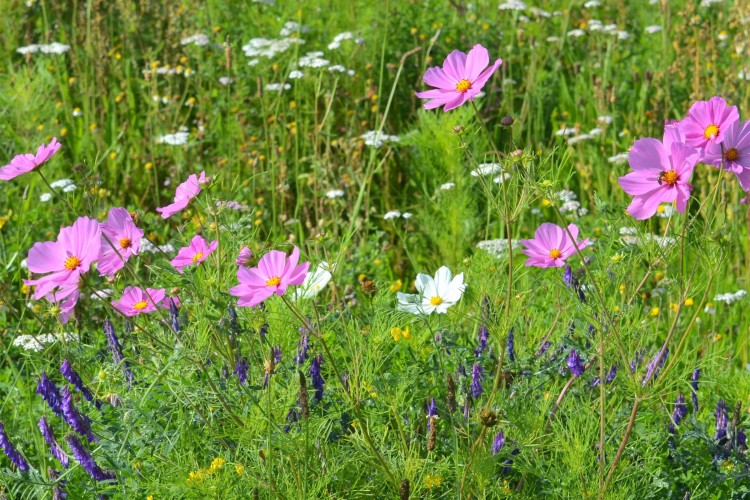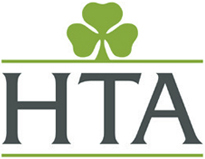Cottage Garden Wildflowermat
Pricing options will be displayed when a postcode has been entered aboveCottage Garden Wildflowermat
Suitable for:
• Attracting Bee’s & Wildlife Into Your Garden
• Creating Colourful Wildflower Displays
• Boosting Biodiversity
If you enjoy swaying flower heads, buzzing bees and vibrant colours combined with billowing grasses, then you’ll love Cottage Garden Wildflowermat!
Our Cottage Garden Mix is a beautiful combination of native wildflowers and grasses, which create a vibrant and bee-friendly traditional cottage garden. Flowering late spring to early autumn, it is easy to create a longer flowering period by simply underplanting flowering bulbs into the soil before you lay the Cottage Garden Wildflowermat over the top. The bulbs will then burst through the Wildflowermat producing stunning early spring shows of colour!
Cottage Garden Wildflowermat is mainly created using perennial plant species, which will grow back year after year, provided they enjoy the conditions in your garden. Our Cottage Garden mix also includes some annual and bi-annual flowering species, some to give a show of colour while the perennials are blooming and some simply because of their sheer beauty. However, not all of the flowers will appear every year, but when they do, you’ll realise the true beauty of our Cottage Garden Wildflowermat turf.
Key Facts:
• 5% slow growing grasses and 95% native wildflowers.
• A vibrant colourful mix of largely perennial plants, with a small percentage of annual and bi-annual plants.
• A very wide selection of stunning flower varieties in shades of yellow, white, blue, pink, red and purple.
• Requires cutting back once a year, with no other maintenance required
• Suitable for most ground applications, although a low fertility soil is preferred.
• Standard turf mat size is 2000mm x 500mm (1m2).
• The normal weight of Cottage Garden turf is 24Kg per square metre (per roll), although this may vary slightly according to moisture levels. We therefore recommend having two people to install it.
• We recommend laying onto a 150mm minimum depth of low nutrient soil. Please click here to link to our Low Fertility soils.
Low Fertility Topsoil
Key Benefits:
• A vibrant colourful mix of perennial, annual and bi-annual plants for sustainability and lower maintenance.
• Not all of the flowering species are perennial. We’ve included some annual and bi-annual plants too. These may not appear every year, but when they do, they will bring a welcome surprise.
• Long flowering period from late spring through to early autumn.
• Flowering Times: May – September (flowering times will be dependent on your soil type and local weather conditions).
• Cottage Garden Wildflowermat creates a hugely valuable wildlife habitat for a wide selection of small mammals, birds, bees and pollinating insects.
• Cottage Garden Wildflowermat is trimmed before despatch to minimise any damage to plants during transit. Therefore, it will not be in flower when delivered.
• To enjoy flowers in the first flowering season, you must install Cottage Garden before the end of March so that the plants have time to establish prior to summer flowering.
• The balance of plant species in Cottage Garden, is influenced by the local microclimate, weather conditions, plant management and pollinator populations. It’s a truly biodiverse and natural evolving, adaptable product, which will change appearance from year to year.
• Very easy to install, the ground stabilising mat is pre-populated with living plants. Simply prepare the ground as instructed, unroll, peg down (if on a slope), and water frequently until plants and roots are well established.
• Cottage Garden is an important source of food for caterpillars and therefore a vital part of butterfly and moth life cycles.
• Cottage Garden will produce an abundance of autumn seed heads producing a ready supply of insects and larvae for birds.
• The mass of wildflowers will suppress annual weed seeds and helps stop weeds from germinating.
Where to Grow Cottage Garden Wildflowermat?
Cottage Garden Wildflowermat is fairly easy-going provided it has plenty of sunshine and a moist, but well-drained soil. It’s great in deep planters, raised beds, flower borders or as an alternative to your original lawn! The plants in Cottage Garden Wildflowermat like a fairly neutral pH soil, but can adapt to anything but the most acidic or alkaline soils.
To maintain the balance of grasses to flowering plants, we highly recommend installing Cottage Garden Wildflowermat onto Low Fertility Soil. Low Fertility soils help limit soil nutrients allowing wildflowers to establish and thrive with minimal competition. The low nutrients help to prevent grasses from becoming over vigorous, whilst also restricting the growth of other dominating plants so that they do not outcompete the wildflower plants in Cottage Garden Wildflowermat.
For best results, lay your Cottage Garden Wildflowermat onto 150mm of our Low Fertility Soil, which has been especially formulated for growing wildflowers. To learn more about our low fertility soil, please click here!
Low Fertility Topsoil
Wildlife Friendly!
Cottage Garden is grown outdoors on a wildlife friendly plant nursery. We actively encourage birds, insects and other creatures to share the benefits of the plants as they grow. We do not normally use Pesticides and Weedkillers in any wildflower turf production.
What is Cottage Garden Wildflowermat
If you're not familiar with Wildflowermat, it's an innovative landscaping material that allows you to establish dense wildflower planting very quickly and easily. More reliable than seeding and less time consuming than plug planting, Cottage Garden Wildflowermat can only be described as a flower garden on a roll. It's installed and established just like grass turf, but needs less ongoing maintenance than a lawn.
How to Install & Care for your Cottage Garden Wildflowermat.
Maintaining Cottage Garden Wildflowermat is easy and rewarding. Unlike many herbaceous flower borders, Cottage Garden Wildflowermat doesn’t need to be fed, mulched, staked or sprayed, simply leave it to grow unchecked between March and September. You can extend the flowering season by deadheading the plants, but this is not essential. At the end of summer, when all the flowers have faded, you can, if you choose, deadhead as much as you need. Cut your Cottage Garden Wildflowermat back to a height of 10 - 15 cm. If your garden soil is quite fertile, you may need to trim your Wildflowermat a couple of times during the autumn and winter months, just to keep it neat.
What Seeds are In Cottage Garden Wildflowermat?
Please note, percentages refer to the weight of the seed in the growing mix and do not necessarily reflect the proportions of mature plants.
5% native grasses
The addition of grasses help prevent the soil drying out whilst providing valuable shelter for insects, food for birds and perches for butterflies:
• Tufted hair grass
• Brown top bent grass.
95% Flowering Plants
For a colourful display that provides lots of pollen and nectar to support beneficial insects all the way from early spring to late autumn.
• Achillea millefolium
• Birdsfoot trefoil
• Bladder Campion
• Columbine
• Common Knapweed
• Common mallow
• Corn chamomile
• Cornflower
• Cosmos albatross
• Cosmos Gloria
• Erigeron 'Profusion'
• Field scabious
• Linaria - Northern lights
• Meadow saxifrage
• Melton Pastels
• Nettle leaved bellflower
• Ragged robin
• Red campion
• Ribwort plantain
• Rose Campion
• Sweet violet
• Thrift
• Turfted vetch
• Viper’s bugloss
• White breeze
• White campion
• Wild thyme
• Vervain
• Yarrow
• Yellow horned poppy
Purchasing Options:
• This product is sold by the square meter (m2), Wildflowermat rolls generally measure 2m x 0.5m which equates to 1 sq.mt, but can vary depending on the cutting machine being used.
• There is no minimum order quantity, however delivery will be on a pallet, which can take up to 50 wildflower turf. So the please try to order as close to a full pallet as you can to keep the pallet delivery costs down.

-74x74.jpg)

-74x74.jpg)
-74x74.jpg)
-74x74.jpg)
-74x74.jpg)
-74x74.jpg)
-74x74.jpg)





